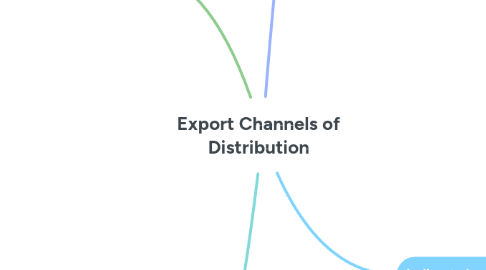
1. Direct channels
1.1. Direct sales to foreign distributors, retailers, or trading companies
1.1.1. Direct marketing from the home country
1.1.1.1. Direct marketing is also used when the manufacturer or retailer desires to increase its revenues and profi ts while providing its products or services at a lower cost
1.1.2. Marketing through overseas agents and distributors
1.1.2.1. Overseas agents
1.1.2.1.1. Overseas agents are independent sales representatives of various noncompeting suppliers.
1.1.2.1.2. Disadvantages of using agents
1.1.2.2. overseas distributors.
1.1.2.2.1. These are independent merchants that import products for resale and are compensated by the markup they charge their customers
1.1.2.2.2. disadvantages of using distributors
2. Determinants of channel selection to market products abroad
2.1. 1. International marketing objectives of the firm
2.2. 2. Manufacturer’s resources and experience
2.3. 3. Availability and capability of intermediary
2.4. 4. Customer and product characteristics
2.5. 5. Marketing environment
2.6. 6. Control and coverage.
3. Major clauses in representation agreements
3.1. 1. Definition of territory and product
3.2. 2. Representative’s rights and obligations
3.3. 3. Exporter’s rights and obligations
3.4. 4. Definition of price
3.5. 5. Renewal or termination of contract.
4. Indirect channels
4.1. Advantages
4.1.1. Little or no investment or marketing experience needed. Suitable for fi rms with lim-ited resources or experience
4.1.2. Help increase overall sales and cash flow
4.1.3. Good way to test-market products, develop goodwill, and allow clients to become familiar with firm’s trade name or trademark before making substantial commitment.
4.2. Exports through independent parties acting as sales intermediary
4.2.1. Exporters that sell on behalf of the manufacturer
4.2.1.1. Manufacturer’s export agents (MEAs)
4.2.1.1.1. Handle direct marketing, promotion, shipping, and sometimes financing of merchandise. The agent does not offer all services
4.2.1.1.2. Take possession but not title to the goods. The MEA works for commission; risk of loss remains with the manufacturer.
4.2.1.1.3. Represent the manufacturer on a continuous or permanent basis as defi ned in the contract.
4.2.1.2. export management companies (EMCs)
4.2.1.2.1. Manufacturer may lose control over foreign sales
4.2.1.2.2. Export management companies that work on commission may lose interest if sales do not come immediately
4.2.1.2.3. Exporters may not learn international business since EMCs do most of the work related to exports.
4.2.1.3. international trading companies (ITCs)
4.2.1.3.1. Trading companies offer more services and have more diverse product lines than ex-port management companies.
4.2.1.3.2. Trading companies are not exclusively restricted to export-import activities
4.2.2. Exporters that buy for their overseas customers
4.2.2.1. Export commission agents (ECAs)
4.2.3. Exporters that buy and sell for their own account
4.2.3.1. Export merchants
4.2.3.2. cooperative exporters (CEs)
4.2.3.3. Webb-Pomerene associations.
4.3. Disadvantages
4.3.1. Lower profit margin due to commissions and other payments to foreign intermediaries
4.3.2. Limited contact/feedback from end users.
4.3.3. Loss of control over marketing and pricing. Firm totally dependent on the marketing initiative and effort of foreign intermediary. Product may be priced too high or too low
4.3.4. Lack of product support by foreign intermediary or may damage market potential
4.3.5. Limited opportunity to learn international business know-how and develop marketing contacts. Creates diffi culty in taking over the business after the relationship has ended.
